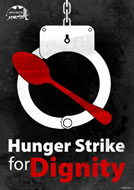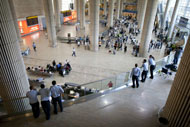
“Silence is complicit”, read one of the signs raised by protesters in front of UN offices in Ramallah. The young men and women in solidarity with Palestinian hunger strikers were sending a message to the UN and to the world: your silence could kill them.
In a way, that is very true. The lives of four Palestinian hunger strikers are hanging in the balance, teetering between life and death. Two in particular – Samer Issawi and Ayman Sharawneh have crossed the 200-day mark without food. The sheer number of days is staggering, difficult for any person to wrap their heads around. And still, the world is more or less disgracefully quiet.
The Palestinians have a right to be angry. The Palestinian prisoner issue has been shuffled aside, ignored and sidelined for years now. International human rights organizations have admitted that grave violations of human rights have taken place behind Israeli bars but Israel has never been held accountable.
While tens of thousands of Palestinians have suffered in Israeli prisons over the decades since the Israeli occupation of 1967, recently, a heroic few have brought this issue back to the fore. Last year, Khader Adnan waged a 66-day hunger strike to protest Israel’s administrative detention policy, which allows Israel to imprison Palestinian political prisoners without charge for an indefinite period of time. Adnan’s strike, which ended in his eventual release and an Israeli promise not to renew his detention, encouraged others silently suffering the same fate to walk in his footsteps.
Today, Samer Issawi, on hunger strike for over 200 days, is most likely dying. Medical reports and lawyer visits tell a haunting tale of a man who has lost more than half of his body weight, is suffering from excruciating muscle and joint pains and who can no longer stand on his own. Ayman Sharawneh is also in grave medical condition, having been rushed to Israel’s Soroka Hospital after days in isolation in a Beer Sheva-area prison. Tareq Qadan and Jaafar Izzedin are also on hunger strike, weak but determined.
In a letter to his people, Samer Issawi shows that despite his weak body his is still strong-willed.
“My message is that I will continue until the end, until the last drop of water in my body, until martyrdom…I say to my people: I’m stronger than the occupation army and its racist laws. I, Samer al-Issawi, son of Jerusalem, send you my last will that, in case I fell as a martyr, you will carry my soul as a cry for all the prisoners, man and women, cry for freedom, emancipation and salvation from the nightmare of prisons and their harsh darkness.”
Samer, freed in the Shalit prisoner swap between Hamas and Israel in October 2011, was re-arrested in July 2012 on a technicality. Issawi, who was ostensibly banned from entering the Jerusalem-area town of Al Ram, was ‘caught’ there and detained for violating the terms of his release. Israeli prison authorities informed him he would have to serve out the remainder of his original sentence of 20 years. And so, he stopped eating at the beginning of last August, refusing to accept the unjustness of his situation.
It has even taken Palestinians too much time to rise up in protest. Since the prisoners began their hunger strike, there have been solidarity activities, tents and confrontations with the Israeli army in their name, but it has not been until recently that the real protests have begun. Khader Adnan declared his own hunger strike in solidarity, holed up in the Red Cross office in Ramallah and Ayman Sharawneh’s family have all stopped eating in solidarity with their son.
But, with the exception of the few and far between statements of ‘concern’ for the lives of the prisoners, the international community has said nothing. And so, coupled with their genuine concern for the lives of their brothers, husbands, sons and comrades, the Palestinians are enraged that the world would sit back and watch these good men die. Even if one of them perishes, the Palestinians will surely hold the world accountable for not stepping in and saving them.
Those who have not lived through such a struggle and under such harsh and inhumane circumstances cannot fully understand the significance of this act. These brave men are not starving to death just for their own sakes. For most, that would never be enough. But for those dedicated to the cause and to Palestine, this is the price of freedom they are willing to pay.
Joharah Baker is a Writer for the Media and Information Department at the Palestinian Initiative for the Promotion of Global Dialogue and Democracy (MIFTAH). She can be contacted at [email protected].









